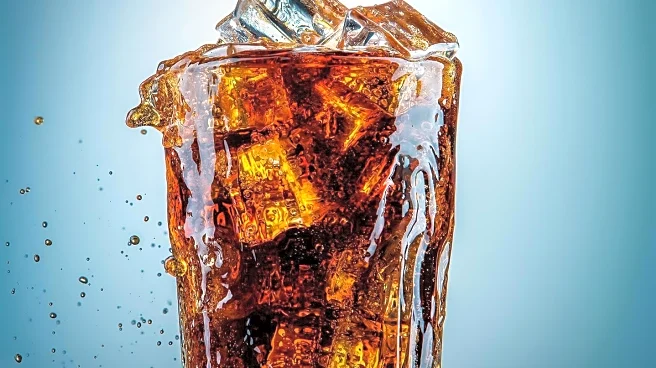What's Happening?
A recent study presented at UEG Week 2025 has highlighted the potential health risks associated with the consumption of both sugar-sweetened beverages (SSBs) and low- or no-sugar-sweetened beverages (LNSSBs).
The research, which followed 123,788 adults from the UK Biobank, found that individuals consuming more than 250 grams of these beverages daily had a significantly higher risk of developing metabolic dysfunction-associated steatotic liver disease (MASLD). Specifically, the study noted a 60% increased likelihood of MASLD for those consuming LNSSBs and a 50% increase for those drinking SSBs. The study also found that LNSSB consumption was linked to liver-related mortality, while SSBs were not. The findings challenge the perception that 'diet' sodas are a healthier alternative, as both types of beverages were associated with higher levels of liver fat.
Why It's Important?
The study's findings are significant as they challenge the common belief that diet sodas are a healthier choice compared to their sugar-laden counterparts. With MASLD becoming the most common chronic liver condition worldwide, affecting over 30% of the population, these findings could have substantial implications for public health recommendations and dietary guidelines. The research suggests that both SSBs and LNSSBs contribute to liver fat accumulation, potentially leading to serious health issues such as liver inflammation and liver-related deaths. This could prompt a reevaluation of dietary advice and encourage a shift towards healthier beverage choices, such as water, to mitigate the risk of liver disease and other metabolic health issues.
What's Next?
The researchers plan to further investigate the causal mechanisms behind these findings through long-term, randomized, and genetic trials. They aim to explore how sugar and its substitutes interact with the gut microbiome and influence liver disease. This future research could provide deeper insights into the biological processes involved and potentially lead to more targeted dietary recommendations. Additionally, public health campaigns may intensify efforts to educate consumers about the risks associated with both sugar-sweetened and artificially sweetened beverages, promoting water as the safest and healthiest choice.
Beyond the Headlines
The study raises important questions about the role of artificial sweeteners in diet and health. While they are often marketed as a healthier alternative to sugar, the potential negative impact on liver health suggests a need for caution. The findings also highlight the complex relationship between diet, gut health, and metabolic diseases, underscoring the importance of comprehensive dietary strategies that consider the broader implications of food and beverage choices.









